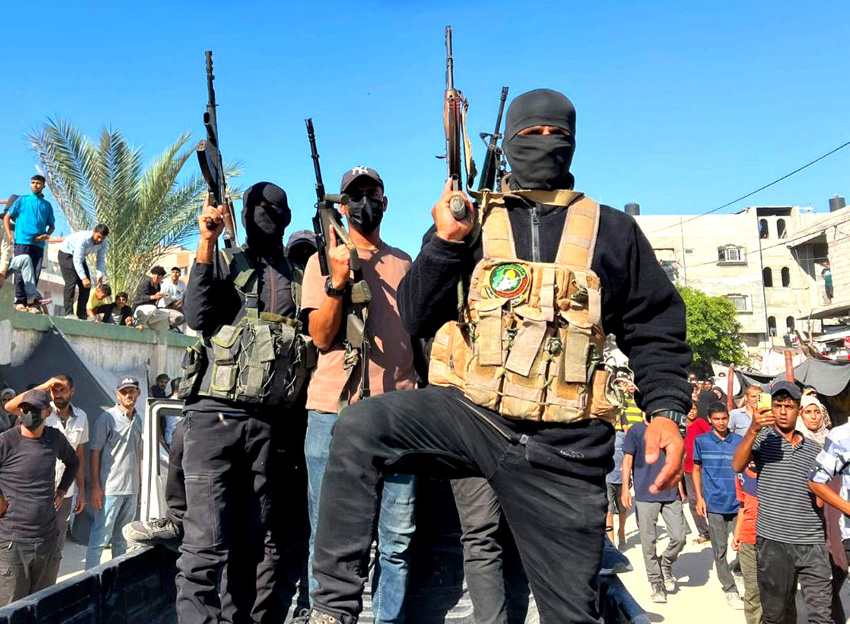HAMAS has accused Israeli Prime Minister Benjamin Netanyahu of blocking the handover of Israeli captives’ bodies and obstructing humanitarian aid to Gaza, calling his actions part of a ‘fascist policy of collective punishment and political manipulation of humanitarian files’.
In a statement on Thursday, the Islamic Resistance Movement said Netanyahu’s threats to delay the reopening of the Rafah crossing and restrict aid deliveries ‘expose his government’s vindictive agenda toward Gaza’s civilians’.
Hamas said the recovery of the bodies ‘will take some time’, as several were buried in tunnels destroyed by Israeli airstrikes, while others remain under the rubble of demolished buildings. It held Israel fully responsible for the destruction that has prevented recovery operations.
The group said the bodies it has been able to retrieve were transferred immediately, but further recovery requires specialised equipment that Israel continues to block.
US President Donald Trump announced on 9 October that Israel and Hamas had agreed to the first phase of a ceasefire and prisoner exchange after indirect negotiations in Sharm el-Sheikh.
The deal provides for Hamas to return the bodies of 28 Israeli captives in exchange for Israel’s release of bodies of Palestinians killed during its ongoing genocide in Gaza.
Since 7 October 2023, more than 238,000 Palestinians have been killed or wounded, most of them women and children.
Over 11,000 remain missing and hundreds of thousands displaced amid famine and the collapse of basic infrastructure.
Dozens of Palestinian bodies returned by Israel in recent weeks have shown clear signs of field executions and torture.
Gaza’s health authorities said they received 120 bodies in three batches, many of them unidentifiable. Forensic examinations revealed burns, crushed limbs, close-range gunshots and evidence of severe mutilation. Several were bound with plastic restraints or chains.
Dr Mohammed Zaqout, director general of Gaza’s hospitals, said only six victims have been identified due to Israel’s refusal to share DNA data.
Health Ministry director Munir al-Bursh described the scenes as ‘unprecedented horror’, with victims ‘blindfolded, bound like animals, and burned, clear evidence of execution and torture after months of captivity’.
The Euro-Med Human Rights Monitor confirmed the findings, citing evidence of executions by hanging and close-range shootings.
Al-Mizan Centre for Human Rights said these acts constitute war crimes and crimes against humanity under the Fourth Geneva Convention.
Euro-Med called for immediate access by independent medical and human rights teams to document and preserve evidence and urged the International Criminal Court to expand its investigation into Israel’s crimes.
Israeli occupation storms homes and deploys infantry in the streets
ISRAELI occupation forces shot and killed 20-year-old Mahdi Ahmed Kamil during a raid on Qabatiya, south of Jenin, on Thursday evening.
The Palestinian Ministry of Health confirmed his death, reporting that troops stormed homes, deployed infantry through the streets, and arrested at least one person.
Kamil’s killing raises the number of Palestinians martyred in Jenin Governorate since Israel’s assault on the city and its refugee camp began on 11 January 2025 to 51.
Early on Friday, Israeli forces carried out further raids across the occupied West Bank, injuring two civilians with live fire.
The Palestinian Red Crescent said a boy was shot in Kafr Aqab, north of occupied Jerusalem, and another young man wounded in Qabatiya.
Troops also raided Al-Shuyukh and Sa’ir in the al-Khalil Governorate, breaking into homes and conducting searches.
In Tayeh, south of Tulkarm, a young man was arrested, while another incursion entered Nablus through the Al-Murabba’a checkpoint.
In Deir Ghassaneh, west of Ramallah, soldiers raided the home of ex-detainee Yousef Dawood. Later, near the Atara Bridge north of Ramallah, Israeli troops opened fire on a passing vehicle, injuring and arresting two young men before sealing off the town and blocking civilian movement.
Entrances to nearby towns including Ein Yabroud, Beitin, Deir Dibwan, and Burqa were also closed.
In Nablus, a special unit stormed the Al-Mukhfieh neighbourhood, shooting Ihab Abu Rayala in the leg before arresting him.
Youth activist Haitham Al-Kaabi was detained after a raid on his home. Two more men, Ahmad Saif Fuqaha and Fares Ayman Najjar, were arrested in Anabta, east of Tulkarm.
The raids coincide with a surge in settler violence during the olive harvest, a key source of income for Palestinian families.
Official figures show settlers have carried out 7,154 attacks on Palestinians and their property in the West Bank over the two years of Israel’s genocide in Gaza, killing 33 people and displacing 33 Bedouin communities.
Since the start of the war on Gaza, occupation forces and settlers have killed at least 1,052 Palestinians in the West Bank, wounded about 10,300, and arrested more than 20,000, including 1,600 children.
Legal challenge to government ban on Palestine Action goes ahead
A LEGAL challenge to the government’s ban on the direct action group Palestine Action will proceed next month after the Court of Appeal rejected a Home Office bid to block it.
On Friday, three judges led by the Lady Chief Justice upheld High Court Judge Mr Justice Chamberlain’s decision to grant Palestine Action co-founder Huda Ammori permission to pursue a judicial review of the group’s proscription under the Terrorism Act.
The ban, which came into effect on 5 July, marked the first time a direct action network had been designated a ‘terrorist organisation’, placing it in the same category as groups such as Islamic State.
Since then, more than 2,000 people have been arrested under the Terrorism Act for actions as minor as carrying placards reading: ‘I oppose genocide, I support Palestine Action.’
The Home Office argued that any challenge should be made through the Proscribed Organisations Appeal Commission (POAC), which Parliament established for such cases.
However, Chamberlain ruled that the High Court was able to deliver a faster and clearer judgment, particularly regarding those already facing criminal charges arising from the ban.
The full judicial review will be heard over three days beginning 25 November.
